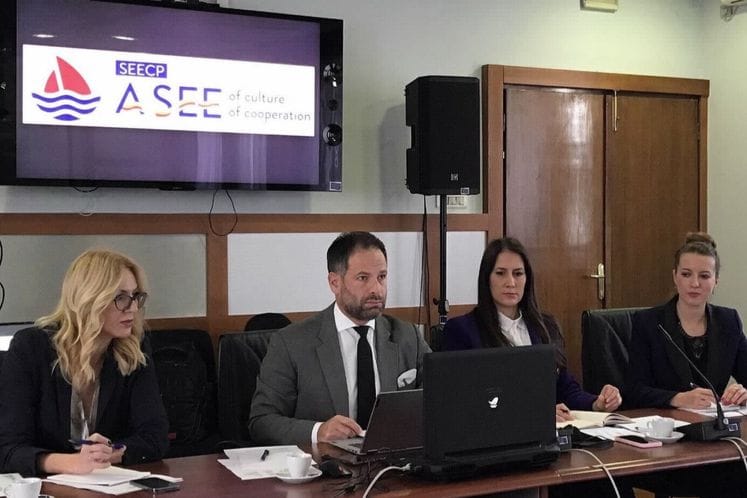- Government of Montenegro
Ministry of Foreign Affairs First meeting of political directors within Monten...
First meeting of political directors within Montenegro's SEECP chairmanship

The first meeting of the South-East European Cooperation Process (SEECP) politicial directors was held today online, within Montenegro's chairmanship of SEECP, as one of the most important regional initiatives in the area from Ankara to Ljubljana.
13 national coordinators from all SEECP member countries, Head of Political Department in the Regional Cooperation Council (RCC) Amer Kapetanović and the representatives of the European Commission participated at the meeting chaired by the Acting Director General for Multilateral Affairs in the Ministry of Foreign Affairs Radovan Bogojević.
Participants supported the calender of activities and the priorities of the Montenegrin chairmanship, a motto of which is A South-East Europe of Culture, A South-East Europe of Cooperation“, as multiple cultural bonds provide a strong basis for further improving partnerships between countries of the region.
During its one-year SEECP chairmanship, Montenegro will work on strengthening the security cooperation, in light of ever more complex geopolitical environment, caused by the Russian agression in Ukraine. In that context, it was assesed that numerous political, economic and security consequences demand common action and a coordinated approach. European partners pointed out the importance of improving the resilience of institutions to cyber attacks. In that context, support was expressed for our country in facing this challenge, where the Regional Center for Cybersecurity Capacity Building, to be based in Montenegro, will have an important role.
Expectation that the mobility agreements that were recently adopted at the Berlin Process Summit, and provide cornerstones of the Common Regional Market as well as an encouragement for the future integration into the EU Single Market, will soon be ratified. With their application, numerous possibilities and easier mobility will be made possible, as citizens will be able to travel across the Western Balkans only with an ID, while higher education qualifications for medical doctors, dentists and architects will be recognized within the region.
In the context of energy security and sustainability, the need for research of unused potentials of the region, through increased investments in infrastructure and new sustainable sources of energy was emphasized. It was commonly stressed that the support package to the Western Balkans worht one billion euros, which was announced by the president of the European Commission Ursula Von der Leyen, is of exceptional importance for mitigating the consequences of the energy crisis and strengthening resilience of our energy sectors.
Opinions were exchanged on the SEE 2030 Strategy – the development plan of the South-East Europe, and the role of private and finacial sectors in sustainable development, financing development and the green tranformation was pointed out. Participants discussed about topics important for the functioning of the Regional Cooperation Council, which is an executive body of SEECP.
South-East European Cooperation Process (SEECP) is a regional framework which gathers 13 countries (Albania, Bosnia and Herzegovina, Bulgaria, Montenegro, Greece, Croatia, North Macedonia, Moldavia, Romania, Slovenia, Serbia, Türkiye and Kosovo), and was initiated in June 1996. with the aim of promoting and strengthening good neighborly relations between Countries of the SEE. Montenegro became a member of the initiative on 11th of May 2007 and this is the second time it took the chairmanship, first being in 2010.
